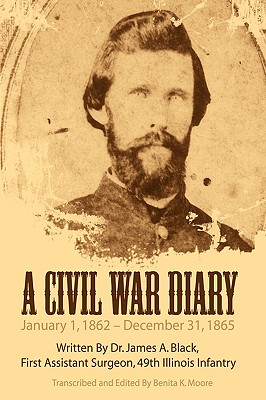Assistant Surgeon James A. Black takes the reader on a seldom traveled journey--a fourteen hundred sixty-one day excursion--as he participates in the American Civil War. During his sojourn the Union soldier openly shares his observations, his joys, his concerns, and his frustrations, as he provides the reader with tremendous insight into the daily lives of soldiers in their camps and on their campaigns some one hundred fifty years ago. Black and a contingency of Southern Illinois men enlisted in the Union Army October 6, 1861. The 49th Illinois Infantry Regiment was mustered into service December 31, 1861, briefly trained at Camp Butler, near Springfield, Illinois, and was engaged in combat by February, 1862. The regiment remained active in the Western Theatre of action for the duration of the war. Although the diary does not offer revolutionary revelations about the war or its generals, it does present interesting and revealing perceptions about the conflict, especially concerning the impact on soldiers involved in prolonged military engagement. Black's perspective as a Civil War soldier is unique in many ways. For the first year he wrote with the view of an enlisted infantryman, while the last three years he viewed events from the eyes of a commissioned medical officer. In addition, James Black, a good soldier, was a strong believer in the Union cause, a religious man, and a moralist. In many ways his thoughts reflect the times and yet many thoughts do not necessarily follow conventional Civil War wisdom. The diary is completely unabridged and void of interpretation or comment by scholars. Simply, the diary is James' personal story as he lived it.
| FindBook |
有 1 項符合
A Civil War Diary: Written by Dr. James A. Black, First Assistant Surgeon, 49th Illinois Infantry的圖書 |
 |
A Civil War Diary: Written by Dr. James A. Black, First Assistant Surgeon, 49th Illinois Infantry 作者:Moore 出版社:Authorhouse 出版日期:2008-09-23 語言:英文 規格:精裝 / 376頁 / 22.9 x 15.2 x 2.5 cm / 普通級 |
| 圖書館借閱 |
| 國家圖書館 | 全國圖書書目資訊網 | 國立公共資訊圖書館 | 電子書服務平台 | MetaCat 跨館整合查詢 |
| 臺北市立圖書館 | 新北市立圖書館 | 基隆市公共圖書館 | 桃園市立圖書館 | 新竹縣公共圖書館 |
| 苗栗縣立圖書館 | 臺中市立圖書館 | 彰化縣公共圖書館 | 南投縣文化局 | 雲林縣公共圖書館 |
| 嘉義縣圖書館 | 臺南市立圖書館 | 高雄市立圖書館 | 屏東縣公共圖書館 | 宜蘭縣公共圖書館 |
| 花蓮縣文化局 | 臺東縣文化處 |
|
|
圖書介紹 - 資料來源:博客來 評分:
圖書名稱:A Civil War Diary: Written by Dr. James A. Black, First Assistant Surgeon, 49th Illinois Infantry
|










